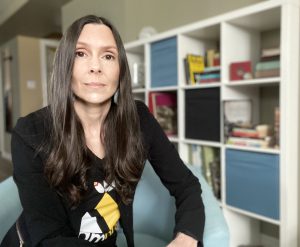This Indigenous History Month (June), Mount Saint Vincent University is proud to launch a groundbreaking collaboration with the University of King’s College with the introduction of a new Indigenous Media Literacy course (GPRL 6203 / PBRL 4405). The course begins this week and will run for three weeks during the month of June. It is open to students at MSVU (both graduate and undergraduate students in communication studies and public relations), King’s and Dalhousie University.
Media Literacy Through Indigenous Perspectives
Led by Trina Roache, an award-winning journalist and assistant professor in the School of Journalism, Writing and Publishing at the University of King’s College and a member of the Glooscap First Nation, the course aims to critically analyze the representations of Indigenous peoples in the media and explore ways to reimagine a decolonized media landscape. According to Trina, the course will draw upon a Mi’kmaw worldview, and her extensive experience as a journalist, to delve deep into how the media functions, Indigenous media coverage, and the possibilities for decolonizing media.
An Immersive Learning Experience
 “This is an incredibly unique course situated in Mi’kma’ki and taking care to weave Mi’kmaw culture and key concepts into our class environment in a way you don’t often see in university,” shared Trina.
“This is an incredibly unique course situated in Mi’kma’ki and taking care to weave Mi’kmaw culture and key concepts into our class environment in a way you don’t often see in university,” shared Trina.
“The course follows a condensed and intensive format for three weeks in June,” said Dr. Amy Thurlow, professor in the Department of Communication Studies at MSVU. “Trina will lead an insightful and critical curriculum, enhanced by participation from several Indigenous Elders and knowledge-keepers, and experience visiting in community and sharing traditional foods.”
Going beyond traditional lectures, the course features sessions on food sovereignty, language, hands-on cultural activities and field trips. Through these immersive experiences, students are encouraged to critically examine media narratives, understand Mi’kmaw worldviews, and imagine a decolonized media landscape.
Trina further explained, “This course will take a critical look at the role media plays in shaping the narrative of Indigenous Peoples in Canada, and examine historical and contemporary representations of First Nations, Inuit, and Métis people. We’ll delve into how journalism functions, exploring its ethics, key principles, and the day-to-day realities reporters face. By examining these aspects, we aim to understand how they impact the coverage of Indigenous stories.”
Trina also highlighted that the course will apply the concept of Etuaptmumk, or Two-Eyed Seeing, to further incorporate Mi’kmaw culture and ways of knowing into the class discussions.
Expanding Indigenous Perspectives
 “We are looking forward to this new opportunity for our students, marking the first Indigenous media and communication course in our curriculum. And we hope to be able to offer this course regularly in the future,” said Amy.
“We are looking forward to this new opportunity for our students, marking the first Indigenous media and communication course in our curriculum. And we hope to be able to offer this course regularly in the future,” said Amy.
“We are so fortunate to have Trina’s expertise in our work to incorporate Indigenous perspectives in our department and curriculum,” Amy continued. “Trina has developed a wonderful opportunity for our communication and public relations students, both graduate and undergraduate, to learn from an
Indigenous perspective in an interactive and engaging way.”
Advancing education in Truth and Reconciliation and promoting Indigenous worldviews in the work of the institution are priorities for MSVU as articulated in its current strategic plan.
Learn More
The course is open to all Indigenous and non-Indigenous students from MSVU, King’s and Dalhousie. To learn more about the Indigenous Media Literacy course, please contact Trina Roache at Trina.Roache@ukings.ca or Amy Thurlow Amy.Thurlow@msvu.ca.